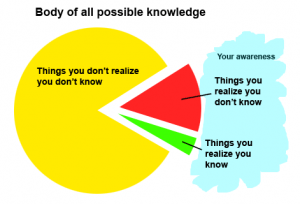 How, what you don’t know that you don’t know, is biting you… and you can’t see what bit you without help
How, what you don’t know that you don’t know, is biting you… and you can’t see what bit you without help
If I asked you what it is that you don’t know that you don’t know… no matter how long you looked, you would not see anything, because it is either that you don’t know or the question is stupid.
But everything that is missing for you to know is in that: what you don’t know that you don’t know.
The question is: is there a way to see what you don’t know that you don’t know? The answer is: yes… other people’s blind spots are different from yours.
And then some people specialize in that area…
Malcolm Gladwell is the guy who you want to look at for many of the “We didn’t know that we didn’t know” cultural blind spots.
We as individuals, and we as society, live life with blinders on, and we don’t know it. We want more knowledge, but we are looking at the wrong place.
Someone needs to have an extraordinary background, and the idea that most things we need to know are in the area of ((the pie chart of what is knowable,)) DKDK, the biggest slice that could be known, what we don’t know that we don’t know.
We, culturally, live our whole life inside the I know that I know and I know that I don’t know, and then ask questions from there, and go to school to move stuff into I know that I know category.
In the meantime life doesn’t make sense, life has no meaning, our lives, our relationships, our societies, our science don’t work… because the answers to the questions we didn’t ask are left for extraordinary men like Malcolm Gladwell, Werner Erhard, and humble me.
But the internet, and courses, and books are full of the things we know, and even if there are things touched on: it takes someone with flexibility to be willing to go there, to follow the “things” down the rabbit hole… and see where it goes.
I had to abandon memory, and knowledge, and mind, to be able to do it. When I am on a call, oftentimes I don’t remember words. Same when I write.
I need to put all of myself into the “I don’t know that I don’t know” and look from there. No knowledge… see what I see.
Oftentimes I have no concept to wrap around what I see, and I file it away: I have no idea what I saw. But without explanation or words, these disappear.
And oftentimes, after I read a book, utterly fascinated, I don’t know what to do with it… Malcolm Gladwell’s Outliers is such: I am deeply impressed, but it’s so far from what you know you know and what you know that you don’t know, that bridging it has been taking me time… and no bridge yet.
I am also reading “Blink” from Gladwell… and this is my hunch that is happening: unless I categorize people with an easy method, I am going to continue trying to cater to people who won’t do anything they get from me.
Oh, I guess you didn’t know. Most people, even when they pay me, do nothing with what I give them…
So, I am thinking that a very simple, maybe simplistic way to decide, is this: do they read the book I recommend? Do they find the time to read the Outliers, or not?
So far one person indicated that he is reading it, and I am very happy about that. That’s it.
There are 37 people who shelled out a whole sum of three dollars to have access to all the subscribers area items, a total value of a few thousand dollars. The rest of you… not interested. Very telling.
If you buy stuff from me, but you piss on my leg… what is our relationship?
Read the original article: How, what you don’t know that you don’t know, is biting you… and you can’t see what bit you without help